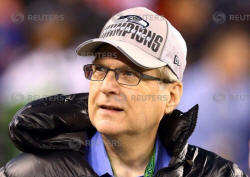Microsoft co-founder Paul Allen dies of cancer
complications at 65
 Send a link to a friend
Send a link to a friend
 [October 16, 2018]
By Bill Rigby [October 16, 2018]
By Bill Rigby
(Reuters) - Microsoft Corp <MSFT.O>
co-founder Paul Allen, the man who persuaded school-friend Bill Gates to
drop out of Harvard to start what became the world's biggest software
company, died on Monday at the age of 65, his family said.
Allen left Microsoft in 1983, before the company became a corporate
juggernaut, following a dispute with Gates, but his share of their
original partnership allowed him to spend the rest of his life and
billions of dollars on yachts, art, rock music, sports teams, brain
research and real estate.
Allen died from complications of non-Hodgkin's lymphoma, a type of
cancer, the Allen family said in a statement.
In early October, Allen had revealed he was being treated for the
non-Hodgkin's lymphoma, which he also was treated for in 2009. He had an
earlier brush with Hodgkin's lymphoma, another cancer, in the early
1980s before leaving Microsoft.
Music-lover Allen had a list of high-profile friends in the
entertainment business, including U2 singer Bono, but preferred to avoid
the limelight at his compound on Mercer Island, across Lake Washington
from Seattle, where he grew up.
Allen remained loyal to the Pacific Northwest region, directing more
than $1 billion to mostly local philanthropic projects, developing
Seattle's South Lake Union tech hub that Amazon.com Inc <AMZN.O> calls
home and building the headquarters of his Allen Institute for Brain
Science there.

Gates described Allen as following the Microsoft partnership with a
"second act" focused on strengthening communities and in a statement
said, "I am heartbroken by the passing of one of my oldest and dearest
friends."
Current Microsoft Chief Executive Satya Nadella on Monday called him a
"quiet and persistent" man who changed the world.
“He is under-appreciated in Seattle," said David Brewster, founder of
local news website Crosscut.com and the Seattle Weekly newspaper. “He’s
remote and reclusive. There’s too much Howard Hughes in the way he
behaves for Seattle truly to appreciate a lot of the good that he does.”
Paul Gardner Allen was born in Seattle on Jan. 21, 1953, the son of a
librarian father and teacher mother. He was two years older than Gates
but when they met in the computer room at the exclusive Lakeside School
in Seattle in 1968, they discovered a shared passion.
"In those days we were just goofing around, or so we thought," Gates
recalled in his 1985 book "“The Road Ahead."
FROM BOSTON TO ALBUQUERQUE
Allen went on to Washington State University but dropped out in 1974 to
take a job with Honeywell in Boston. While there, he pestered Gates, who
was studying at nearby Harvard, to quit school and join the nascent
revolution in personal computing.
Gates finally agreed and in 1975 the two jointly developed BASIC
software for the Altair 8800, a clunky desktop computer that cost $400
in kit form.
The pair moved to Albuquerque, New Mexico, close to the Altair's maker,
and formed a company. It was Allen's idea to call it Micro-Soft, an
amalgam of microcomputer and software. The hyphen was later dropped.
Allen was in charge of Microsoft's technical operations for the
company's first eight years, making him one of the handful of people who
created early software such as MS-DOS and Word that enabled the PC
revolution and thrust Microsoft to the top.

But he had ceased to be on the cutting edge of software development by
the early 1980s. He never displayed the commercial instinct of Gates,
who generally is credited with powering Microsoft's rise to ubiquity in
the 1990s.
Allen left Microsoft in 1983 after falling out with Gates and his new
lieutenant, Steve Ballmer, in December 1982, only months after being
diagnosed with Hodgkin's lymphoma. As he recalled in his 2011 memoir
"Idea Man," he overheard Gates and Ballmer secretly plotting to reduce
his ownership stake.
"They were bemoaning my recent lack of production and discussing how
they might dilute my Microsoft equity by issuing options to themselves
and other shareholders," Allen wrote.
Gates and Ballmer later apologized but the damage was done and Allen
left Microsoft, although he remained on the board until 2000.
CANCER BATTLES
Allen recovered from his cancer after radiation treatment but in 2009
was diagnosed with non-Hodgkin's lymphoma, another form of blood cancer.
He went into remission in April 2010 but the disease resurfaced in 2018.
[to top of second column] |

Seattle Seahawks owner Paul Allen on the field before Super Bowl
XLVIII against the Denver Broncos at MetLife Stadium in East
Rutherford, New Jersey, U.S., February 2, 2014. Mandatory Credit:
Mark J. Rebilas/File Photo

Allen held onto his share of the company. His 28 percent stake at Microsoft's
initial public offering in 1986 instantly made him a multi-millionaire.
His wealth peaked at about $30 billion in late 1999, according to Forbes
magazine, but Allen was hurt by the sharp decline in Microsoft stock after the
dot.com bubble burst in 2000 and some unprofitable technology investments.
In October 2018, Forbes magazine estimated his wealth at $21.7 billion and said
he was the 44th richest person in the world.
Allen, the owner of 42 U.S. patents, liked to cast himself as a technology
visionary who drove Microsoft's early success and saw the future of connected
computing long before the Internet.
"I expect the personal computer to become the kind of thing that people carry
with them, a companion that takes notes, does accounting, gives reminders,
handles a thousand personal tasks," Allen wrote in a column in Personal
Computing magazine as far back as 1977, long before portable computers became a
reality.
In the same year, he outlined an early vision of what turned out to be the
Internet to Microcomputer Interface magazine.
"What I do see is a home terminal that's connected to a centralized network by
phone lines, fiber optics or some other communication system," he said. "With
that system you can perhaps put your car up for sale or look for a house in a
different city or check out the price of asparagus at the nearest grocery market
or check the price of a stock."
Allen later called this sweeping idea the "wired world," which has broadly come
to fruition. He was not alone in predicting connected computing but was one of
the most prominent.
Yet Allen's technology ventures after Microsoft, which focused on areas he
thought would grow with the advent of the "wired world," were not as successful.
He lost $8 billion in the cable television industry, chiefly with a bad bet on
cable company Charter Communications <CHTR.O>, while technology ventures he
bankrolled such as Metricom, SkyPix and Interval Research were costly failures.

SPORTS TEAMS, A YACHT AND HENDRIX
He had better luck in sports and real estate. Allen bought the Portland Trail
Blazers basketball team in 1988 and became a local hero in 1997 when he
purchased the Seattle Seahawks football franchise after the previous owner had
tried to move the team to California. The Seahawks won the Super Bowl in
February 2014 and both franchises are now valued at many times what Allen paid
for them.
Allen also made hundreds of millions of dollars redeveloping South Lake Union, a
shabby area of downtown Seattle that became a gleaming technology Mecca and site
of Amazon.com's glass "spheres" headquarters.
All the while, the never-married Allen pursued myriad personal projects and
pastimes. He owned one of the world's biggest yachts, the 400-foot (122 meters)
Octopus, which was the venue for many lavish parties and the base for scuba
expeditions.
A rock 'n' roll aficionado, Allen had a band on call to jam with when he wanted,
and spent more than $250 million building a museum devoted to his hero, Jimi
Hendrix, which morphed into a music and science fiction exhibit designed by
Frank Gehry.
He spent millions more on a collection of vintage warplanes and funded the first
non-government rocket to make it into space. He also collected priceless
antiquities and works by Monet, Rodin and Rothko to put in his extensive art
collection.
Like Gates, Allen was a dedicated philanthropist, giving away more than $1.5
billion in his lifetime and pledging to donate more than half his wealth to
charity.
Through various vehicles, Allen focused his giving on brain science, motivated
by the loss of his mother to Alzheimer's disease, along with universities and
libraries.
(Reporting by Bill Rigby; additional reporting by Ismail Shakil in Bangalore;
Editing by Bill Trott)
[© 2018 Thomson Reuters. All rights
reserved.] Copyright 2018 Reuters. All rights reserved. This material may not be published,
broadcast, rewritten or redistributed.
Thompson Reuters is solely responsible for this content. |